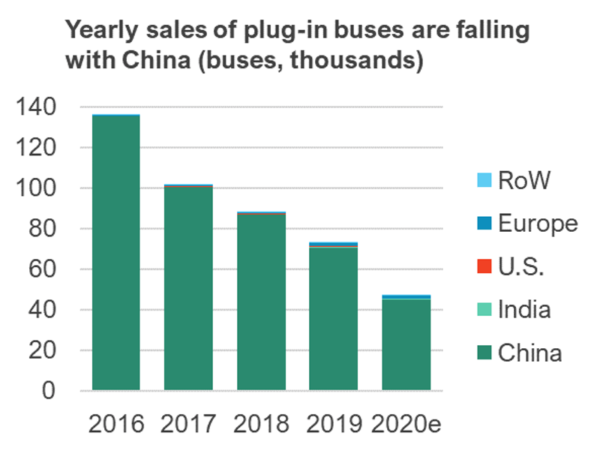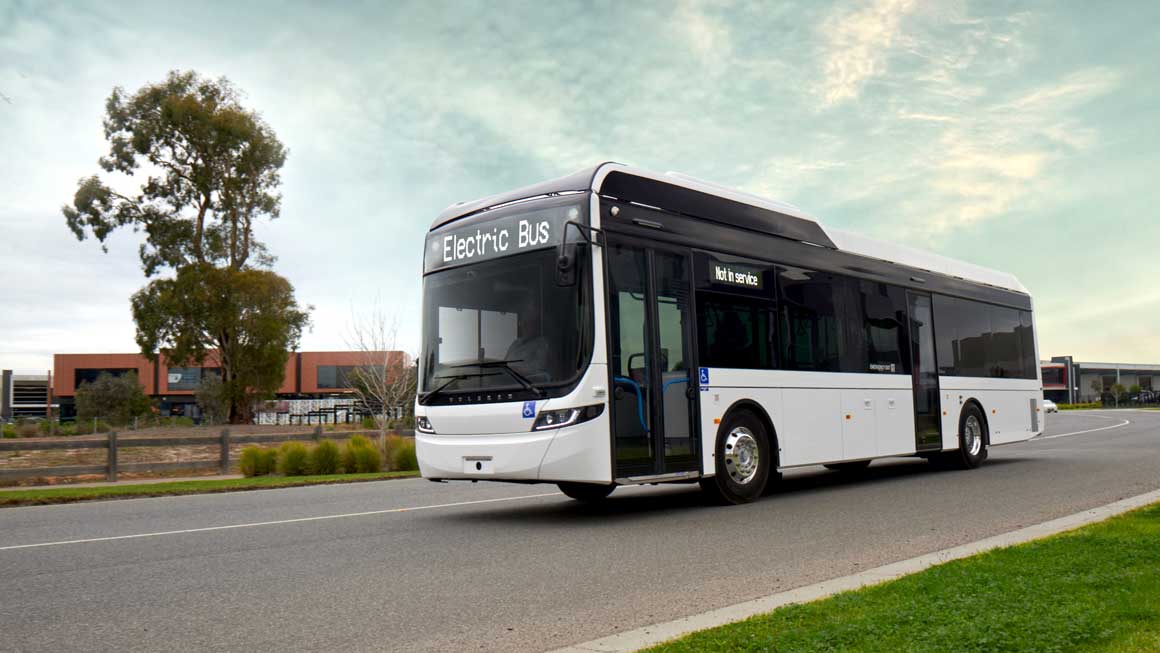Global market research firm IDTechEx today released its second major report into the no-emissions bus market — Electric, Hybrid and Fuel Cell Buses 2021-2040 — which confirms China to be at the forefront of battery electric bus (BEV) development to the extent that its manufacturing will dominate world sales of these vehicles for the coming 20 years.
China has poured billions of dollars of subsidies into supporting development of BEVs in recent years, which IDTechEx says “has established a world-beating cost base and technology which is spreading to other countries”.
The report cites Europe as an example of a market that sold more than 1,800 electric buses in 2019, more than double the 2018 sales of around 750, which were largely supplied by China’s BYD and Yutong manufacturers
IDTechEx says the “pressing need for cities around the world to improve air quality, alongside commitments by many governments to address climate change, are powering efforts to deliver zero on-road emission city bus fleet solutions”.
Rapid advances in BEVs, says the report, are already side-lining plug-in hybrid buses and threaten to derail “the much hyped fuel cell powertrain (FCEV)”, which it says will remain a small fraction of the market “because they fail to offer the same total cost of ownership benefit as BEV”.
It anticipates the global BEV bus fleet will increase to 817,000 vehicles by 2030, which is more than double the current BloombergNEF estimate of 400,000 BEVs on the roads worldwide.

Image: IDTechEx
Four electric buses being trialled in Sydney
In Australia, public transport company Transit Systems has been trialling four electric buses based on BYD chassis on Sydney inner-city routes since July last year, and the NSW State Transport Minister Andrew Constance announced in October last year that his government was seeking proposals to transition Sydney’s 8,000 buses to all-electric-powered vehicles as part of the state’s goal of reaching zero net emissions by 2050.
Transport for NSW has since called for expressions of interest to trial electric buses and enable the fleet-wide transition, and estimates that increase in the state’s electricity demand from electrification of the fleet will be in the order of five to 10 per cent — which could provide a boost to solar and wind generation in the state, provided the government chose to source its extra requirement from renewables.
Elizabeth Mildwater, Deputy Secretary of Transport for NSW said in May when announcing the intention to run further trials, “We have to meet our environmental challenges head-on and learn from cities around the world. We are committed to taking advantage of new technology that reduces the impact that current diesel buses have on air quality and people’s health.”
Brisbane is set to deploy 60 high-capacity (150-180 passengers) electric buses designed for use in peak hours and for public transport to major events, by 2023, pending modification of transport infrastructure including flash-charging facilities; the Brisbane Metro all-electric fleet will be provided by Swiss-based bus manufacturer HESS and Australian bus-body manufacturers Volgren.
Last year, Volgren launched its first battery electric locally assembled bus built on a BYD 12.2-metre-long K9 chassis, to take advantage of various Australian state ambitions to clean up public transport, and reduce the emissions burden in cities in particular. The bus runs on 16 battery packs with a total 324 kWh capacity — or around 300 km range.
And one in Melbourne..
In Melbourne, the Transdev 12-month trial of this Volgren Optimus body on a BYD chassis, has so far been deemed a success, with the vehicle plying the busy Punt Road route. The trial will conclude in January 2021, when the Victorian Government is expected to make further decisions on the potential rollout of electric buses.
At the same time, Australian-based Transit Systems is bucking the report projections, to pursue development of hydrogen-cell bus technology, having recently signed an MOU with Ballard Power Systems, BOC Limited and Palisade Investment Partners, to evaluate and demonstrate the value of hydrogen-fuel-cell electric buses for use in public transport in Australia.
The Electric, Hybrid and Fuel Cell Buses 2021-2040 report says although progress is being made on FCEV buses, developers “are chasing a moving target”.
That is, falling battery-pack prices, improved charging infrastructure and bus schedules optimised for charging BEVs, will mean that “by the time sufficient hydrogen infrastructure is available to enable the widespread commercialisation of FCEV buses their deployment may be limited to long daily mileage applications”.
As the IDTechEx research points out, the market is shifting rapidly. While Australia works on getting hydrogen infrastructure up and running, the report authors note that green hydrogen supply is critical to delivering on FCEVs’ “promised environmental and economic credentials”.
On a carbon-footprint basis, it emphasises that the use of hydrogen produced from fossil fuels without CO2 capture is nonsense.
Similarly, electric buses recharging from a fossil-fuelled grid have little CO2 cred, even if they do allow city dwellers to breathe more easily, live more comfortably on quieter bus routes and offer better conditions for bus drivers.
This content is protected by copyright and may not be reused. If you want to cooperate with us and would like to reuse some of our content, please contact: editors@pv-magazine.com.









By submitting this form you agree to pv magazine using your data for the purposes of publishing your comment.
Your personal data will only be disclosed or otherwise transmitted to third parties for the purposes of spam filtering or if this is necessary for technical maintenance of the website. Any other transfer to third parties will not take place unless this is justified on the basis of applicable data protection regulations or if pv magazine is legally obliged to do so.
You may revoke this consent at any time with effect for the future, in which case your personal data will be deleted immediately. Otherwise, your data will be deleted if pv magazine has processed your request or the purpose of data storage is fulfilled.
Further information on data privacy can be found in our Data Protection Policy.